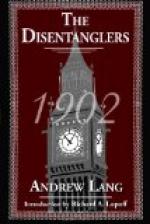Merton assumed an air of grave interest.
’Pappa left it in his will that I was to marry the man (under the age of five-and-thirty, and of unimpeachable character and education) who should discover, and add to the museum, the most original and unheard-of natural variety, whether found in the Old or the New World.’
Merton could scarcely credit the report of his ears.
‘Would you oblige me by repeating that statement?’ he said, and Miss McCabe repeated it in identical terms, obviously quoting textually from the will.
‘Now I understand your unhappy position,’ said Merton, thoroughly agreeing with the transatlantic critics who had pronounced the late Mr. McCabe ‘considerable of a crank.’ ’But this is far too serious a matter for me—for our Association. I am no legist, but I am convinced that, at least British, and I doubt not American, law would promptly annul a testatory clause so utterly unreasonable and unprecedented.’
‘Unreasonable!’ exclaimed Miss McCabe, rising to her feet with eyes of flame, ’I am my father’s daughter, and his wish is my law, whatever the laws that men make may say.’
Her affectation of slang had fallen off; she was absolutely natural now, and entirely in earnest.
Merton rose also.
‘One moment,’ he said. ’It would be impertinence in me to express my admiration of you—of what you say. As the question is not a legal one (in such I am no fit adviser) I shall think myself honoured if you will permit me to be of any service in the circumstances. They are less unprecedented than I hastily supposed. History records many examples of fathers, even of royal rank, who have attached similar conditions to the disposal of their daughters’ hands.’
Merton was thinking of the kings in the treatises of Monsieur Charles Perrault, Madame d’Aulnoy, and other historians of Fairyland; of monarchs who give their daughters to the bold adventurers that bring the smallest dog, or the singing rose, or the horse magical.
‘What you really want, I think,’ he went on, as Miss McCabe resumed her seat, ‘is to have your choice, as you said, among the competitors?’
‘Yes,’ replied the fair American, ‘that is only natural.’
‘But then,’ said Merton, ’much depends on who decides as to the merits of the competitors. With whom does the decision rest?’
‘With the people.’
‘With the people?’
’Yes, with the popular vote, as expressed through the newspaper that my father founded—The Yellow Flag. The public is to see the exhibits, the new varieties of nature, and the majority of votes is to carry the day. “Trust the people!” that was Pappa’s word.’
’Then anyone who chooses, of the age, character, and education stipulated under the clause in the will, may go and bring in whatever variety of nature he pleases and take his chance?’
‘That is it all the time,’ said the client. ’There is a trust, and the trustees, friends of Pappa’s, decide on the qualifications of the young men who enter for the competition. If the trustees are satisfied they allot money for expenses out of the exploration fund, so that nobody may be stopped because he is poor.’




